CODE_n SPACES residents | BABYBE Medical is changing lives with heartbeats
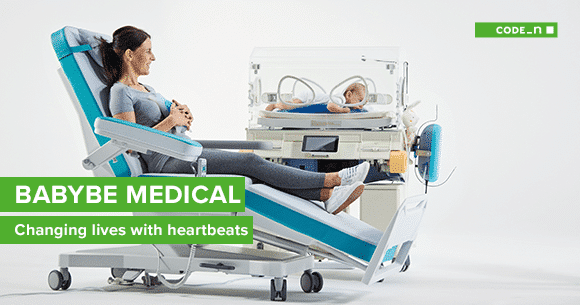
Startups are comprised of mind-blowing ideas, motivated employees and the desire to bring innovation in the form of a service or product that will ultimately disrupt and affect the future of work. Our CODE_n Resident BABYBE Medical is one such pioneer disrupting the MedTech sector by bringing the importance of family and human contact into the center of healthcare and thus improving the lives of premature babies with a revolutionary remote device. Every year, 3.3 million babies are born preterm. Through the ingenious technology of “bionic emulation”, BABYBE created a womb-like environment by replicating something that feels like the heartbeat and voice of the mother. We sat with CEO and founder, Camilo Anabalón, who is also the Product Designer, and COO Maximilian Blendinger, Technology Manager, to fill us in on everything that has happened in their journey so far and what their future plans are.
Jessica: It’s been almost two years since you moved in to our CODE_n SPACES. What has happened since then for BABYBE Medical? Give us a quick summary.
Camilo: When we first moved to the CODE_n SPACES, we were bringing the product into the market and developing our commercial strategy. We had two main projects running and our main goal was to expand in sales and visibility. These are long-term goals that are currently still in process. One of the major developments is that we have established partnerships with several institutions and have one of the biggest health insurance in Germany, Techniker Krankenkasse, backing the project.
Medical Technology is a very complex market to be working in as a startup. Figuring out how to do it lean has been fun, but also very challenging. As a MedTech company, we need to conduct a clinical study to validate the product in order to bring it into the market. We devised a model where we converged the process of conducting clinical validation with sales by allowing institutions to purchase BABYBE at a lower cost in order to implement the service earlier.
Max: Being a medical company, you won’t have fast milestones in comparison to consumer-focused startups. It takes much longer until you get to these major milestones, especially when you are a young startup company with a new and innovative product. The whole journey has been very difficult but also very rewarding in discovering how we could perform new and different tasks with the same team.
Jessica: In the beginning, it was difficult for you to find investors in Germany and so you branched out to the international market. How have things changed since then?
Camilo: When you establish a MedTech company in the startup model, you cannot count on gaining funding in a specific region. When it comes to funding a company like this, I think the best way to get funded is to consider the global market. You have to be globally minded because funding relies a lot on expertise, which isn’t usually located centrally.
In the beginning, we started applying for seed funding in Germany, but didn’t get any grants because the industry in which we are working in was not the industry that was best supported in this area at the time. By the end of 2015, every penny of funding had come from outside Germany. At that time, we had our prototype ready for the market and were already working in hospitals. Only then did we get support from the state of Baden Wuerttemberg. We learned from this experience what it means to be a lean company and globally minded.
Jessica: Has there been a significant change in the industry? What is the role of startups and new innovative products in the medical sector?
Camilo: The medical field isn’t as fast paced as some other sectors, therefore launching a product in this environment is really tough because things don’t change much. Experts are impressed when young companies with innovative ideas survive and the products or services are implemented in hospitals. The industry is set up and defined by roles and functions such as doctors, nurses, and patients. Slowly we are seeing a shift in the healthcare system, mainly in pediatrics. When the conception of the patient changes, it changes how the patient will be taken care of. Automatically, following this attitude, change is seen as innovation.
The medical industry is changing to look at the patient (baby) as a person rather than as an item that is fragile, delicate or dangerous to touch to include the social aspects of the human being. Our product follows and was born from this new way of thinking – from finding ways to help provide that care that one wants to give.
Jessica: Why do you think this shift is mainly happening in pediatrics?
Camilo: Pediatrics is very complicated and complex because you cannot talk with the patient. You need to find ways to communicate and relate to them and these patients respond best with their family. In the medical field, there was no social role a family member could take for the patient, only those with jobs in the institution were permitted. Today, families are accepted as having a crucial role in the healthcare of the baby and you can evidently see what kind of affect it has on the patient.
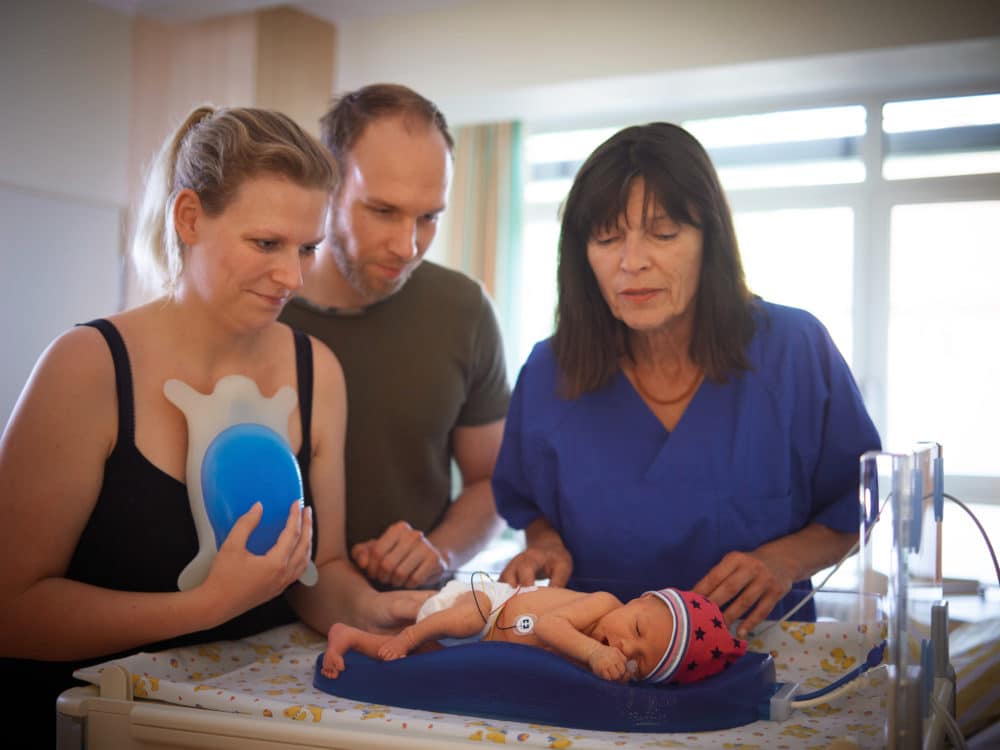
Scientists have also proved that how we relate to certain people actually affects our healthcare. An example of this (that particularly resonates with BABYBE) is that Kangaroo mother care has been proven to have a positive effect on both the mother and the child. Instead of using drugs or medicine, a person is used to influence the patients’ condition. This kind of development gives us scientific basis for the product and supports the new mindset that fueled the technical side of our project. With BABYBE we bring the expertise needed to create this new story currently being built in healthcare.
Jessica: BABYBE is based in Stuttgart, Germany, but strongly operates in the international market. Why did you choose Germany and what have you learned from the exchange?
Max: We are a German-based company because of the local availability of resources and institutions and the fact that Germany is one of the biggest markets concerning premature babies. It may not be the best market in the world because Germany isn’t as accepting or open to new innovations in comparison to countries like the Netherlands, however, there are certain benefits such as how the healthcare system is structured. Germany is also more compartmentalized due to federal regulations and the structure of the government. Here, you have access to a different kind of path to the market in comparison with France for instance, where everything is centralized, limiting your options and bringing a lot of other complications.
Camilo: What we have learned by crossing boundaries is that the shortest line to your goals is not always going to your neighbor. In terms of producing your product, the shortest way is China. In terms of early access to hospitals, in our case, is Chile, mainly because it is easier and cheaper to organize a study there and there is also a lot of talent and motivation to implement such products.
Another thing is that having the product manufactured in Germany has its advantages. It is not something to be disregarded because it is very different to have your product manufactured and stamped ‘made in Germany’ due to the reputation of the market itself. Also, when you can say that you have run a clinical study and tested your product in Germany, there is a level of credibility automatically linked to your reputation.
Jessica: How has the company grown and developed?
Camilo: It is true that we haven’t grown in size, but we have grown a lot in experience and product development. I think that our way of working can be explained through this philosophy: you can either bring more talented people into a company or you can develop your people. In the beginning, BABYBE was working solely on building the product. Alongside that we developed the skills and knowledge needed for business, such as marketing, finance, expertise, and building up a network. We are all individually engaged in the whole process, therefore becoming experts in bringing medical products or innovations into the market. I believe this is something much more valuable – having an overview of the process is more valuable than being an expert on one thing and knowing the specifics.
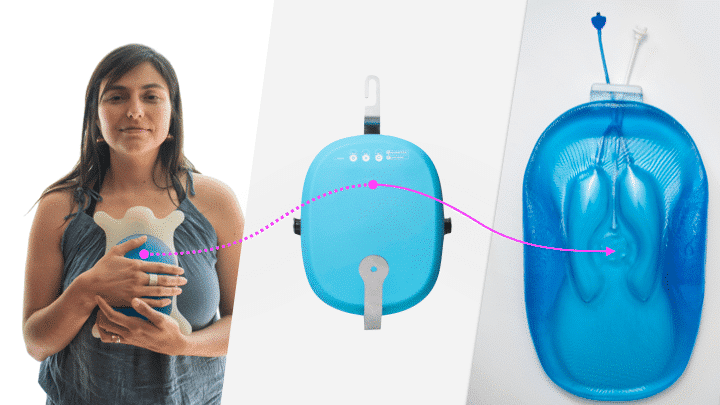
Jessica: Your recent venture is the BABYBE APP. Tell us more about this exciting development where parents can share messages and heartbeat with their premature babies.
Camilo: We actually have two apps: the BABYBE App and the BABYBE Player. The app is the short version dedicated to play the moments and the player is connected to the baby system in the hospital which transfers whatever the parent sends to the baby through the app directly to the baby in the incubator machine.
In the app, clients create a profile as a parent and a profile for their baby. They can then add family members to the group per invitation. This setup is important because it creates the type of boundaries of access to the information of the baby. It is our goal to secure a safe environment where parents can share information about their baby.
The app has one specific function and three environments. We call this specific function moments, which are voice messages and heartbeat transmitted. This is our key feature in the Apple Watch. The three environments are family/family group, moments and milestones. Moments is the ledger where you can store all of the moments for the family to see and play whereas milestones is pretty much a journal of the baby’s infancy – an album containing the baby’s development stages.
Jessica: Some of your achievements include that you’ve met the Prime Minister of Scotland, been featured on the BBC and in various newspapers in Germany, and have travelled globally. What would you consider to be the best experience from founding this revolutionary HealthTech startup?
Max: For me, it is the moment when I first entered a hospital and I was able to see the intensive care units, where the incubators are. You instantly have an emotional sensation. When you know you have something that helps overcome the preemie issue, to help break the boundaries of the glassy incubators and establish a connection between a mother and a baby – that is the highlight! The results are visible through the peoples’ lives one touches, not necessarily through statistics.
Camilo: For me, it was when a dear friend of mine had given birth prematurely and got to use the BABYBE turtle system. It is amazing to see how the parents and baby react to the technology and you see your effort become tangible. The whole situation concerning premature births is insanely crazy! What I learned and understood was how big of an impact it is for parents and what parents go through.
Jessica: Last but not least, what is next for BABYBE Medical?
Camilo: We are at the stage where the BABYBE system needs to be updated. The concept is still the same, but we will be improving things on a technical level. We are looking forward to releasing the new version in the third quarter of 2019. In the meantime, we will also add more features to the BABYBE app. The idea of togetherness is at the center of what we do, therefore we need to create a common space for our products to come together. This includes getting our customers involved and on board with this mindset. Our vision is that the BABYBE App will not only be used for medical or clinical purposes, but also used to become a consumer project. We want to create a continuous line from birth to the early infancy of a child in the app that allows the connection between parents and child to develop and increase.
Jessica: That sounds very exciting indeed. What an amazing privilege it is to be working on a product that breaks down boundaries and bridges relationships. Thank you both so much for the insightful interview.



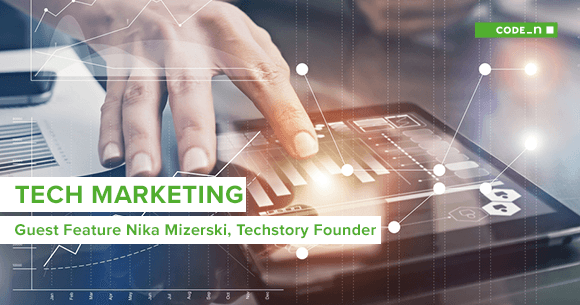
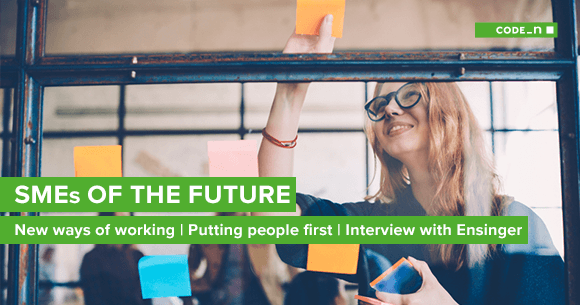
Write a comment